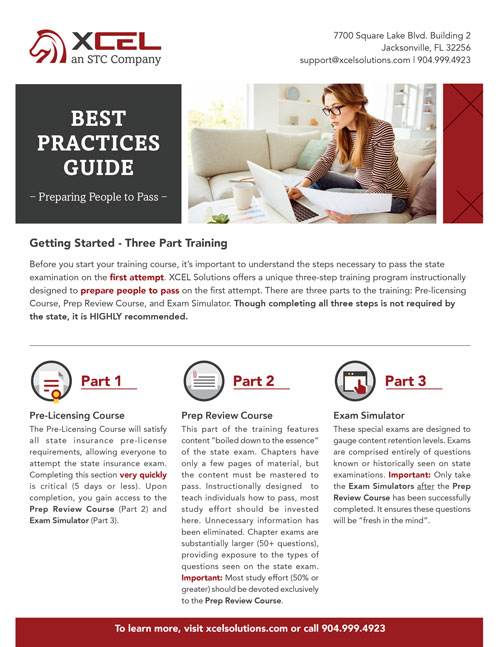Getting your Life and Health insurance license is one of the first requirements for a fulfilling and impactful insurance career. As a licensed professional, you have a crucial role in safeguarding the financial well-being of your clients and their families, offering peace of mind during challenging times. Beyond financial stability, becoming a Life and Health insurance agent also allows for your personal growth and continuous learning, since the insurance landscape is continually evolving. You have the potential to make a positive impact on the community by promoting awareness about the importance of insurance and assisting individuals in securing a better future. In essence, acquiring a Life and Health insurance license is not just a career choice; it is a pathway to making a meaningful difference in people’s lives.
In this guide, we’ll show you step-by-step how to get an insurance license for Life and Health insurance products. This guide will cover key aspects of the process, such as understanding general requirements, researching state-specific regulations, and recommendations for success in your new insurance career.
Getting Started in the Insurance Industry
Insurance is an industry that often rewards dedication and hard work with financial stability and potential for advancement. Whether you are a rising insurance agent or seeking a job in the insurance sector, it’s a good idea to build your knowledge of insurance agent requirements, including pre-licensing education. However, before you jump into insurance exam preparation, you need to decide what kind(s) of insurance you’d like to sell.
In the realm of insurance, the concept of “lines of authority” refers to the specific permissions and responsibilities granted to individuals within an insurance organization. These lines describe the scope of an individual’s role and the types of insurance products or services they are authorized to sell or manage. Insurance professionals typically hold different lines of authority for various types of insurance, such as life, health, property and casualty, personal lines and more.
Obtaining a license for a specific line of authority requires you to complete relevant training and pass examinations to demonstrate your understanding of the associated regulations and coverage nuances. This ensures that insurance agents have the necessary expertise and qualifications to effectively serve clients.
Commons Types of Insurance
Insurance products come in various forms that are designed to address specific risks and provide financial protection:
• Life Insurance: Includes coverage to beneficiaries when the insured person prematurely dies in exchange for premiums paid by policyholder during their lifetime.
Health Insurance: Includes coverage for a portion of medical expenses and doctor’s visits in return for a payment of a monthly premium.
• Property & Casualty Insurance: Property insurance includes coverage for property owners such as homeowners, renters, flood of earthquake insurance. Casualty insurance includes coverage for individuals, employers and businesses for loss of property, damage or other liabilities.
• Personal Lines Insurance: Includes insurance coverage for individuals against loss resulting from death, injury or loss of property.
Deciding to offer different types of insurance can be a game-changer in establishing a thriving insurance career. By offering clients a comprehensive portfolio that includes various insurance types, you can position yourself as a one-stop-shop advisor and cater to diverse needs. This approach not only enhances client satisfaction by simplifying the insurance process but also enables you to build stronger, long-term relationships.
Thinking about a career in insurance?
Learn how you can be successful in insurance by downloading our free Insurance Playbook for new and aspiring agents.
Insurance License Application Process
Once you’ve determined the type(s) of insurance you’d like to sell, the next step is understanding the general requirements. For example, the age requirement for becoming an insurance agent can vary depending on the jurisdiction and the type of insurance license you are pursuing. In many places, individuals must be at least 18 years old to obtain an insurance license. This age requirement ensures that individuals entering the field have reached adulthood and can enter into legally binding contracts. There’s also a background check, including fingerprinting. This step helps identify any potential red flags that could impact a person’s suitability for working in the health and life insurance fields, which involve handling sensitive financial and personal information.
Pre-licensing education is typically a requirement as well. Before sitting for an insurance license exam, you may be required to complete a specified number of hours of pre-licensing education to ensure you have a foundational understanding of the insurance industry, relevant laws, regulations, and ethical considerations.
The content and duration of pre-licensing courses vary by jurisdiction and the type of insurance license sought. For instance, in 2023 the State of California required 20 hours of life insurance pre-licensing education and 12 hours of ethics education, with costs typically ranging between $100 and $300. The State of Illinois required 20 hours of life insurance pre-licensing education, with a minimum of 7.5 hours completed in a classroom setting, with costs also generally ranging from $100 to $300.
Pre-licensing education helps you prepare to pass your state’s insurance license exam, which is a legal requirement for selling insurance. There may be other insurance license eligibility requirements for Life and Health insurance set by each state as well.
Once you’ve become a licensed insurance agent, you’ll need to complete continuing education, too. Continuing education is a regulatory requirement for license maintenance and renewal. It’s also an opportunity for you to remain well-informed about new laws, emerging risks, and innovative products, so you can offer your health and life insurance clients up-to-date and tailored solutions.
Decide on a State and Find Out Its Requirements
It’s essential to recognize that insurance regulations differ by states, including licensing requirements, permissible products, and even the licensing process itself. You’ll need to decide whether to sell insurance in your home state or explore opportunities in another state, then explore that state’s own set of rules governing insurance licensing practices.
The significance of adhering to these regulations cannot be overstated: Non-compliance can lead to legal consequences. You can visit your state’s insurance department website to get up-to-date information on health and life insurance licensing requirements, procedures, and continuing education mandates. This proactive approach ensures you are well-informed and compliant with state regulations.
Research Agencies
Even before you pass your Life and Health insurance license exam, you can start researching insurance agencies as you look for your next potential employer. In fact, some agencies consider hiring candidates before they obtain their insurance license. Understanding the values, reputation, and specific focus areas of each agency can provide valuable insights into whether they align with your career goals and work style. In addition, you’ll want to be aware of any additional requirements for candidates or agents, such as specific certifications or qualifications. Explore the specific hiring processes for each agency, including any training programs or mentorship initiatives they may offer. By arming yourself with this information, you can make informed decisions about applying for insurance agent jobs, and increase your likelihood of finding a fulfilling and compatible role.
Fast Track to Insurance Agent Success
Getting a Life and Health insurance license comes with a set of common challenges. Here are some tips for navigating these hurdles and making your insurance licensing process quick and effective:
• Demanding nature of licensing exams – these exams require you to grasp complex concepts and regulations. Choosing an insurance licensing training provider with rigorous pre-licensing education and practice exams, and that offers different types of learning that fit your own learning style, can enhance your preparedness to pass your exam the first time.
• Meeting state-specific requirements – these can pose logistical challenges, and require careful attention to detail and adherence to application processes. When choosing an insurance license exam training provider, be sure their insurance exam preparation is aligned with your state’s specific regulations and requirements.
• Administrative delays in licensing – staying proactive, maintaining clear communication with licensing authorities, and diligently following up on application progress can help you reduce or avoid these types of delays.
As you begin your journey to prepare for a fulfilling career in the insurance industry, be sure to take all of the steps listed here to ensure you are investing your time in the most effective way possible. Concentrate on your Life and Health insurance exam preparation and don’t let delays or the complexity of insurance agent requirements pull you off course. Soon you will be celebrating passing your insurance license exam and embarking on a satisfying insurance career.




